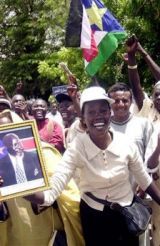Sudan hopes for peace after day of reconciliation
KHARTOUM, July 10 (AFP) — Sudanese hoped Sunday a new era of peace beckoned for their war-ravaged country a day after a new power-sharing constitution came into force and former southern rebel leader John Garang took oath as the new vice president.

|
|
Supporters of the SPLM celebrate as their leader John Garang, seen in photo at left, is sworn as first vice president in Khartoum, Saturday, July 9, 2005. (AP) . |
“I am optimistic. We have waited so long for peace to come,” said Abdul Qadir al-Hajj, a 47-year-old taxi driver in Khartoum.
“The war brought much suffering to us. We have closed a chapter and opened a new one,” added the father of four young children.
The reconciliation and celebrations of Saturday sealed a peace deal that ended Africa’s longest running civil war and marked the start of six year transitional period of power-sharing between the regime and its former southern rebel foes.
But the triumphant million-strong welcome bestowed on Garang as he returned to Khartoum after an absence of 22 years also masked a string of problems that could yet derail the process, as well as deadly unrest brewing elsewhere the country.
“I am hopeful. There are going to be big changes,” said Ibrahim Yussef, a salesman. “Many had not expected this day to come. People on the streets are happy and optimistic about the future,” he added.
Yussef said he was only two years old in 1983 when the southern rebel group, the Sudan People’s Liberation Movement (SPLM) launched an armed uprising against the government in Khartoum demanding greater autonomy for the south.
Khartoum and the SPLM signed their peace deal on January 9 in Kenya’s capital Nairobi, ending the conflict that left an estimated two million people dead and some four million displaced.
In accordance with the agreement that provides for a new wealth and power-sharing arrangement, SPLM leader Garang was sworn in first vice president on Saturday in a ceremony attended by a host of dignitaries.
Garang will also head an autonomous administration due to run the mainly Christian and animist south for a six-year interim period leading up to a promised referendum on independence.
Sudanese President Omar al-Beshir and Garang agreed to join hands and pledged to work together for a better Sudan.
“I believed them,” said al-Hajj.
The ruling National Congress Party (NCP) of Beshir and the SPLM promised to form a broad-base national unity government within one month, which will include the majority of Sudanese political forces.
But some southern militia commanders still have to sign on to the peace agreement and will not be represented in the interim institutions.
And over a dozen northern opposition groups, including the Umma party of former Prime Minister Sadiq al-Mahdi and the Popular Congress of Islamist leader Hassan al-Turabi, have said they will not participate in the new government.
Also potentially overshadowing north-south peace is an ethnic minority rebellion in Sudan’s western Darfur, which Khartoum has not yet managed to quell despite the displacement of over 2 million people and the deaths of at least 180,000.
Another uprising flared up in eastern Sudan recently where rebels are citing decades of economic and political marginalization.
Al-Hajj said he expected a lot from the incoming government but that he was prepared to give its members the benefit of the doubt.
“Let us give them time. A strong and stable government will also bring stability to our lives,” he said, adding what we most cared about was a good education and healthcare system for his children.
“We need the peace of mind that comes with stability,” Yussef added.
A new legislature is to be appointed shortly.
General elections will be held within four years, but until that happens, the NCP will have 52 percent of executive posts and legislative seats and the SPLM 28 percent.
Fourteen out of the remaining 20 percent will go to northern opposition parties, with the remaining six percent to be split among other southern groups.
Garang’s inauguration came after President Beshir formally promulgated the new constitution, bringing to an end the state of emergency that has been in force on and off since he seized power in a 1989 coup.
Former foes Beshir and Garang shook hands and embraced each other.
UN chief Kofi Annan hailed “a day of great hope for the Sudanese people, who have suffered so long.”
